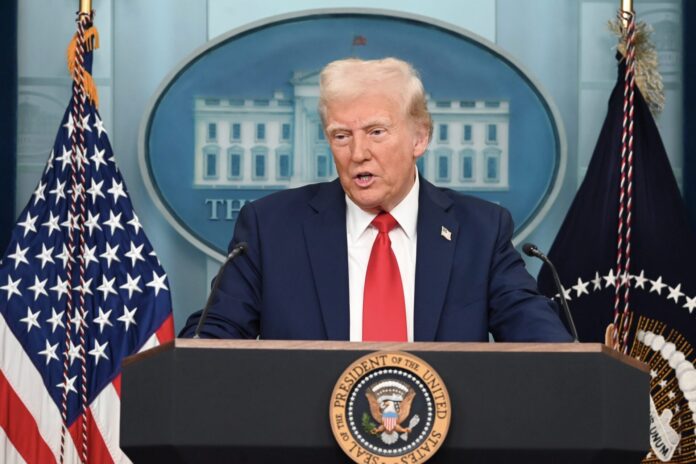
When it comes to the flurry of decisions handed down by the Supreme Court thus far this year, an old, familiar axiom comes to mind: You win some, you lose some.
After all, some decisions have been considered “winning” by President Trump, whereas others have incurred a less-than-favorable reaction from the president.
Then, in some situations, other decisions appear to be a combination of wins and losses, even if the Trump administration focuses on the former over the latter.
And such a decision has just emerged, specifically with regards to the contentious debate over birthright citizenship.
Concisely stated, the debate over birthright citizenship tests the interpretation of the Fourteenth Amendment.
And, given how convoluted information has become in today’s social media-driven world, it is helpful to review the actual text of the Amendment underlying the Supreme Court’s recent decision.
Specifically, Section 1 of the Fourteenth Amendment states the following:
“All persons born or naturalized in the United States, and subject to the jurisdiction thereof, are citizens of the United States and of the state wherein they reside. No state shall make or enforce any law which shall abridge the privileges or immunities of citizens of the United States; nor shall any state deprive any person of life, liberty, or property, without due process of law; nor deny to any person within its jurisdiction the equal protection of the laws.”
Thus, the heart of the debate between the Trump administration and varied judges – in particular Judge Boasberg – clearly centers on two aspects of the above section.
First, the Trump administration challenges how all persons can become automatic citizens … especially if the parents crossed the border illegally and definitely if the parents pose a threat to national security.
A situation that was likely not envisioned by the architects of the Fourteenth Amendment.
Meanwhile, various judges have struck down deportation orders due to the “due process” clause for all citizens embedded in the Fourteenth Amendment.
In essence, the Trump administration and various judges have a fundamentally different opinion of who can be considered a citizen, which has resulted in radical different approaches to mass deportation efforts.
Up until the Supreme Court’s most recent decision, this amendment has been used to justify granting automatic citizenship to anyone born on American soil … regardless of the origins or legal status of the parents.
And, apparently, regardless of criminal background as well, considering that children of notorious drug lord El Chapo have become U.S. citizens via birthright citizenship.
In 2011, CNN reported that El Chapo’s “wife … [gave] given birth to twins in a Los Angeles hospital and returned to Mexico.”
Needless to say, the fact that a notorious drug lord’s children became automatic citizens via birthright citizenship is likely one of several events that invited a reinterpretation of the Fourteenth Amendment.
And that reinterpretation was just partially handed down by the Supreme Court, which addressed the case arose after a major conflict between Trump and varied judges in other states over the president’s plan to end birthright citizenship.
As detailed by the Daily Mail, alongside numerous other media outlets, the Supreme Court voted 6-3 in favor of the Trump administration … at least in part.
“The Supreme Court justices have now ruled those lower judges did not have the power to block Trump’s policies nationwide. However, in a complex ruling, the justices did leave open the possibility that Trump’s specific birthright citizenship policy could still remain blocked. It did not let Trump’s birthright citizenship policy go into effect immediately and did not address its legality, which will be decided at a later date,” the Daily Mail detailed.
In other words, the decision was more of a matter of checks and balances, rather than the legality of birthright citizenship itself.
Unsurprisingly, all six judges who voted in favor of blocking nationwide injunctions are conservative, while the three ostensibly “liberal” judges dissented.
Justice Ketanji Brown Jackson expressed especially strong disagreement, blasting the decision as an “existential threat to the rule of law.”
Though she may well be satisfied with the sufficiently murky aftermath of the decision, as it did not directly address the issue of birthright citizenship.
Instead, it addressed the issue of individual judges’ ability to issue nationwide injunctions.
Regardless of the arguably mixed signals detailed in the ruling, Trump has publicly expressed delight with the decision of the nation’s highest court.
“This was a big one. Amazing decision, one we’re very happy about. This really brings back the Constitution. This is what it’s all about,” Trump gloated.
Trump also continued to provide additional detail regarding the decision, underscoring why it was apparently necessary to prevent substantial interference with the “normal” operations of the executive branch.
“This morning the Supreme Court has delivered a monumental victory for the Constitution, the separation of powers and the rule of law in striking down the excessive use of nationwide injunctions to interfere with the normal functioning of the executive branch,” Trump continued.
Attorney General Pam Bondi also chimed in, expressing her pleasure with the Supreme Court.
“Not one district court judge can think they’re an emperor over this administration and his executive powers, and why the people of the United States elected him,” Bondi proclaimed.
Fair enough point in the near term … though the real battle over birthright citizenship has yet to be resolved.
Author: Jane Jones



